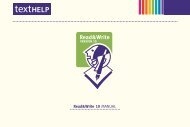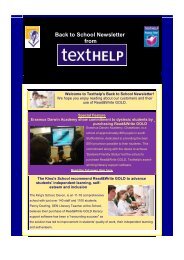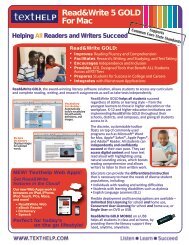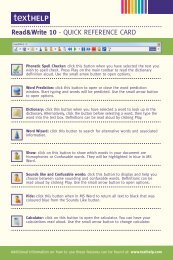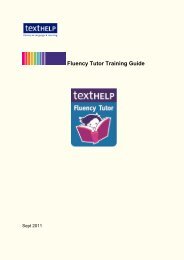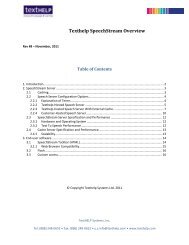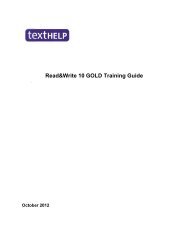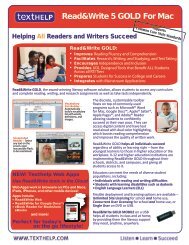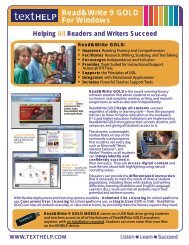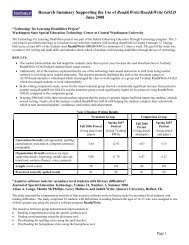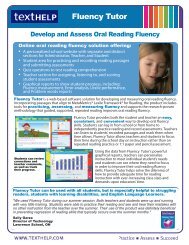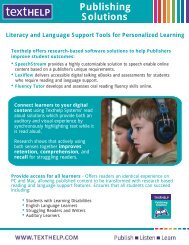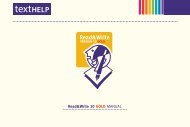01 NRDC Dyslexia 1-88 update - Texthelp
01 NRDC Dyslexia 1-88 update - Texthelp
01 NRDC Dyslexia 1-88 update - Texthelp
You also want an ePaper? Increase the reach of your titles
YUMPU automatically turns print PDFs into web optimized ePapers that Google loves.
168<br />
Research Report<br />
Harris, M. and Hatano, G. (Eds.). (1999). Learning to Read and Write: a cross-linguistic<br />
perspective. Cambridge: Cambridge University Press.<br />
Jackson, N. E. and Coltheart, M. (20<strong>01</strong>). Routes to Reading Success and Failure: towards an<br />
integrated cognitive psychology of atypical reading. Hove: Psychology Press.<br />
Jusczyk, P. W. (1997). The Discovery of Spoken Language. Cambridge, MA: The MIT Press.<br />
Kruidenier, J. (2002). Research-Based Principles for Adult Basic Education Reading<br />
Instruction. Portsmouth, NH: RMC Research Corporation [Accessible at<br />
www.nifl.gov/partnershipforreading/publications/adult.html].<br />
Levine, K. (1986). The Social Context of Literacy. London: Routledge & Kegan Paul.<br />
Locke, J. L. (1993). The Child’s Path to Spoken Language. Cambridge, MA: Harvard University<br />
Press.<br />
Manguel, A. (1996). A History of Reading. London: HarperCollins.<br />
National Reading Panel. (2000). Teaching Children to Read: an evidence-based assessment<br />
of the scientific research literature on reading and its implications for reading instruction.<br />
Washington, DC: National Institute of Child Health and Human Development. [Accessible at<br />
www.nichd.nih.gov/publications/nrp/report.htm].<br />
Olson, D. R. (1994). The World on Paper: the conceptual and cognitive implications of writing<br />
and reading. Cambridge: Cambridge University Press.<br />
Perfetti, C. A. and Marron, M. A. (1995). Learning to Read: Literacy Acquisition by Children<br />
and Adults. Philadelphia: National Center on Adult Literacy. [Accessible at<br />
literacy.org/search/detailed.html].<br />
Purcell-Gates, V. (1995). Other People’s Words: the cycle of low literacy. Cambridge, MA:<br />
Harvard University Press.<br />
Rayner, K., Foorman, B. R., Perfetti, C. A., Pesetsky, D. and Seidenberg, M. S. (20<strong>01</strong>). ‘How<br />
psychological science informs the teaching of reading’. Psychological Science in the Public<br />
Interest, 2(2), 31–74. [Accessible at<br />
www.psychologicalscience.org/newsresearch/publications/journals/pspi2_2.html]<br />
Rée, J. (1999). I See a Voice: a philosophical history of language, deafness and the senses.<br />
London: HarperCollins.<br />
Snow, C., Burns, M. S. and Griffin, P. (Eds.). (1998). Preventing Reading Difficulties in Young<br />
Children (Committee on the Prevention of Reading Difficulties in Young Children,<br />
Commission on Behavioral and Social Sciences and Education, National Research Council).<br />
Washington, DC: National Academy Press. [Accessible at http://bob.nap.edu/html/prydc]<br />
Snowling, M. J. (2000). <strong>Dyslexia</strong>: a cognitive developmental perspective. Oxford: Basil<br />
Blackwell.



